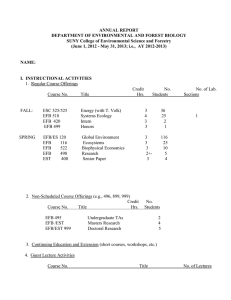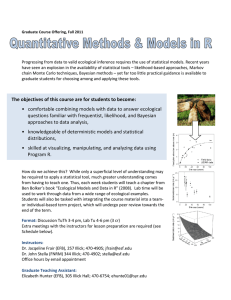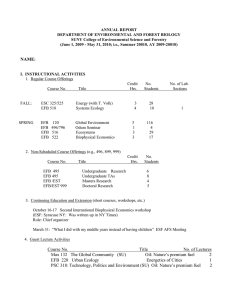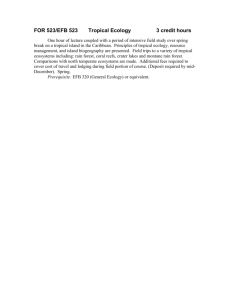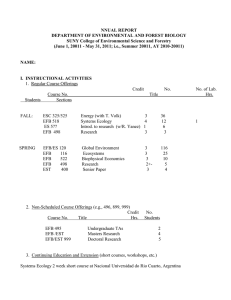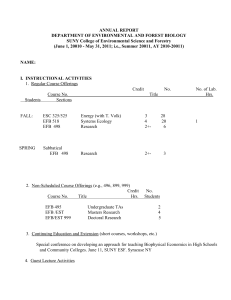ANNUAL REPORT DEPARTMENT OF ENVIRONMENTAL AND FOREST BIOLOGY
advertisement
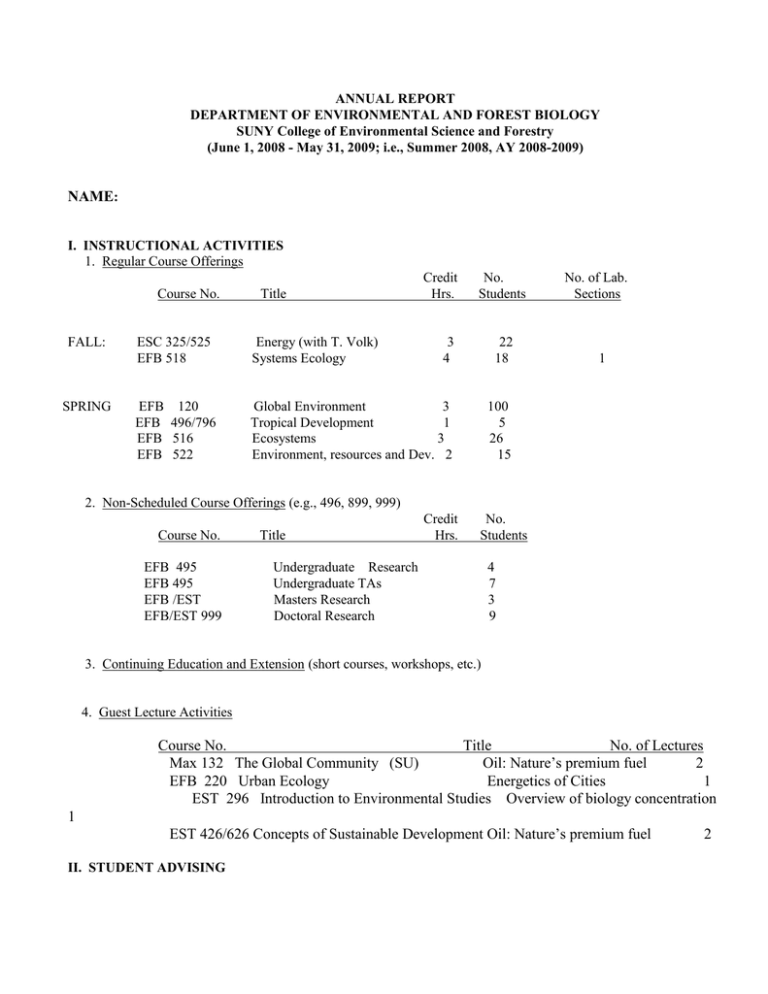
ANNUAL REPORT DEPARTMENT OF ENVIRONMENTAL AND FOREST BIOLOGY SUNY College of Environmental Science and Forestry (June 1, 2008 - May 31, 2009; i.e., Summer 2008, AY 2008-2009) NAME: I. INSTRUCTIONAL ACTIVITIES 1. Regular Course Offerings Course No. FALL: SPRING Title Credit Hrs. No. Students ESC 325/525 EFB 518 Energy (with T. Volk) Systems Ecology 3 4 22 18 EFB 120 EFB 496/796 EFB 516 EFB 522 Global Environment 3 Tropical Development 1 Ecosystems 3 Environment, resources and Dev. 2 100 5 26 15 No. of Lab. Sections 1 2. Non-Scheduled Course Offerings (e.g., 496, 899, 999) Course No. EFB 495 EFB 495 EFB /EST EFB/EST 999 Title Credit Hrs. No. Students Undergraduate Research Undergraduate TAs Masters Research Doctoral Research 4 7 3 9 3. Continuing Education and Extension (short courses, workshops, etc.) 4. Guest Lecture Activities Course No. Title No. of Lectures Max 132 The Global Community (SU) Oil: Nature’s premium fuel 2 EFB 220 Urban Ecology Energetics of Cities 1 EST 296 Introduction to Environmental Studies Overview of biology concentration 1 EST 426/626 Concepts of Sustainable Development Oil: Nature’s premium fuel II. STUDENT ADVISING 2 A. Number of undergraduates for whom you are the student’s official advisor about 20 and unofficial advisor: countless B. Graduate Students: (Name, degree sought, starting date, month & year; if a degree was completed, please give date and full citation for the thesis or dissertation). MAJOR PROFESSOR 1. 2. 3. 4. 5. 6. Aileen Guzman David Murphy Anna Stewart Lindsay Cray Ajay Gupta . Jill McMichaels PhD PhD PhD MS MS MS 8/03 8/07 8/07 8/07 8/07 8/07 CO-MAJOR PROFESSOR (* = active now) (The first two I am essentially THE major professor –I don’t know why they do these things) 1. 2. 3. 4. 5. Suzanna DelGranado PhD (with Jack Manno) 8/07 Karla Hyde MS (with Myrna Hall) 8/05 Seth Myers PhD (with Myrna Hall) 8/05 Whitney Lash PhD (with Valerie Luzadis) 8/06 Steven Balogh MS (with Brenda Nordenstam) 8/08 MEMBER, STEERING COMMITTEE (other than those listed above) 1 a few I cannot remember CHAIRMAN OR READER ON THESIS EXAMS, ETC. One III. RESEARCH COMPLETED OR UNDERWAY A. Departmental Research (unsupported, boot-legged; title - % time spent) Lots B. 1. Grant-supported Research (source, subject, amount - total award and current year, award period starting and ending dates; list graduate research assistants supported by each grant) National Science Foundation $ 5,000,000 (my share $152,000) ($25,000 per year) Long Term Ecosystem Research in the Luquillo Forest Grant period 2006-2012 Supported Whitney Lash and David Murphy US Forest Service Energy and economic analysis for the Caribbean . $20,000 Supports David Murphy Santa Barbara Foundation. ($5,000) Supports two undergraduates for summer) * Various private sources: Multiple Sponsors $4000 Predicting Future Water Quality from Land Use Change Projections in the CatskillDelaware Watersheds” funded by the New York State Department of Environmental Conservation, August 2004 – December 2007, for $272,000 Myrna Hall, P.I. (SUNY ESF) in conjunction with the Yale School of Forestry, Global Institute for Sustainable Forestry. SUNY Research Portion $222,000. (Other ESF investigators: Rene Germain and Charles Hall) 2. Research Proposals pending (as in B.1., above) NSF 0837591 (With Tim Volk and Rick Beal) Developing a multidisciplinary program in energy for small science-based colleges $200,000 (Not funded) NIH. Influence of Climate and Societal Factors on Dengue Transmission in Ecuador With Timothy Endy (Upstate Medical) and Anna Stewart ($980,000) IV. PUBLICATIONS (Full bibliographic citation, i.e., do not use "with Jones," or "Jones, et al."; please list only publications published, in press, or actually submitted during this reporting period --- do not list manuscripts in preparation). A. Refereed Publications Hall, C.A.S., R. Powers and W. Schoenberg. (2008). Peak oil, EROI, investments and the economy in an uncertain future. Pp. 113-136 in Pimentel, David. (ed). Biofuels, Solar and Wind as Renewable Energy Systems. Elsevier, London Hall, C.A.S., Balogh, S., Murphy, D.J.R. 2009. What is the Minimum EROI that a Sustainable Society Must Have? Energies, 2: 25-47. Hall, C.A.S., Day, J.W. Jr. 2009. Revisiting the Limits to Growth After Peak Oil. American Scientist, 97: 230-237. Day, J. W. Jr., Hall, C.A., Yanez-Arancibia, A., Pimentel, D., Marti, C. I., and Mitsch, W. J. 2009. Ecology in Times of Scarcity. BioScience. 59:4, 321-331. Zhao, L., L. Feng and C. A. S. Hall. 2009. Is peakoilism coming? Energy Policy 37: 2136-2138. Harris, N., C.A. S. Hall, C.A.S. and A.E. Lugo. (2009). Empirical estimates of species and ecosystem level respiration of woody stems along an elevational gradient in the Luquillo Mountains, Puerto Rico. Ecological Modeling. 216: 253-264. (In Press/revision) ************************************************************************ Hall, C.A.S. 2009. (In Press). The Ehrlichs strike again. The Dominant Animal: Human Evolution and the Environment. Bioscience. (in press) Gagnon, N., C. A.S. Hall and L. Brinker (Accepted pending revisions). A Preliminary Investigation of Energy Return on Energy Investment for Global Oil and Gas Production. Energies David J. R. Murphy and Charles A. S. Hall (in press). EROI or Energy return on (energy) invested. Ecological Economics: year in review. Willig, M.R. Christopher P. Bloch, Alan P. Covich, Charles A. S. Hall, D. Jean Lodge, Ariel Lugo, Whendee L. Silver, Robert B. Waide, Lawrence R. Walker, and Jess K. Zimmerman. (In press) Long-term Research in the Luquillo Mountains: Synthesis and Foundations for the Future. Chapter 8 in LTER Research in the Luquillo Mountains. Cambridge University Press. Mead, J.V., M. Connerton, C.A.S.Hall and N. Ringler. (in press) . Area compensation of primary production along a gradient of riparian forest cover for a small temperate stream. Journal of the North American Benthic Society. Gowdy, J., Hall, C., Klitgaard, K., and L. Krall. (in press) The End of Faith Based Economics. The Corporate Examiner. B. Non-refereed Publications C. Papers Presented at Science Meetings (give title, date, occasion, and location) Energy return on investment and our economic future Invited plenary speaker: 33rd International Geological Congress, Oslo, 5-14 August 2008 Economic implications of changing EROI ratios. Invited plenary talk. International Association for the study of Peak Oil. Barcelona, Spain October 2008. Ecological Society of America Albuquerque NM. D. Public Service Presentations (lectures, seminars, etc. to and for the public; give group or occasion, date(s), and attendance) Peak oil, EORI and your financial future Colgate University 2008 (40) Peak oil, EORI and your financial future US Military Academy, West Point February 2008 Peak oil, EORI and your financial future Ohio State Univ. April 2009 (60) Peak oil, EORI and your financial future Kenyon College . April 2009 (60) Peak oil, EORI and your financial future SUNY Albany April 2009 (30) (40) Peak oil, EORI and your financial future Wesleyan College April 2009 (60) V. PUBLIC SERVICE A. Funded Service (include consulting activities) 1. Government Agencies (Federal, State, Local): none 2. Industrial and Commercial Groups, etc. none B. Unfunded Service to Governmental Agencies, Public Interest Groups, etc. Many small issues VI. PROFESSIONAL DEVELOPMENT A. Professional Honors and Awards (for teaching, research, outreach, etc.) Distinguished Speaker Wetlands Laboratory Ohio State University B. 1. Activities in Professional Organizations (offices held, service as chairman, member, participant or consultant) None 2. Professional Society Membership AAAS (Fellow) International society of Ecological Economics (Editorial Board) North American Society of Ecological Economics 3. Other Professional Activities a. Editorial activity Journal (s) Responsibility Editorial Board Ecological Economics Managing editing for specific papers Other (books, symposia, etc.) Editorial Board Springer Series on Sustainability b. Reviewer Journal(s) Overview of series No. of manuscripts Ecological Economics Energy Energies Others Agency 3 1 2 No. of proposals Other c. Participation (workshops, symposia, etc.) Name of workshop, etc. Date Place Two week intensive course in systems ecology December 6-20 National University Rio Cuarto, Cordoba Argentina C. Further Education/Re-training Undertaken, Leaves, Workshops, etc. D. Foreign Travel (Where, When, Purpose) Norway August Give plenary lecture at 33rd International Geological Congress, Oslo and study glaciers with my wife (A glacier modeler) Barcelona to give plenary paper at Association for the study of peal oil Argentina To give two week intensive course in systems ecology VII. ADMINISTRATIVE AND SERVICE RESPONSIBILITIES (include committee participation) A. Department-level Promotion and tenure B. College-level President’s committee on a carbon-neutral ESF Committee to set up a renewable energy minor at ESF Informal committee to generate a program in Ecological Economics C. University-wide, including Research Foundation VIII. SUMMARY OF SIGNIFICANT ACTIVITIES AND ACCOMPLISHMENTS DURING THIS REPORTING PERIOD, ESPECIALLY THOSE MOST NOTEWORTHY AND RELATIVE TO THE COLLEGE’S AND DEPARTMENT’S MISSION. One paragraph on each of the following would be most helpful: this past year, what have you done for our students, department/college, and self professionally? NOTE: The information in this section (along with the supporting specific information elsewhere in this report) should be your strongest case for being considered for a discretionary raise, which I’ll continue to award based on your contributions to the department and college this reporting period. [Some of this was unchanged from last year] I continue teaching a very large load (6 courses) to try to bring what I think is important to our students. I am driven, perhaps foolishly, by the concept that if I do not teach e.g. Systems Ecology, Energy or Tropical Development or what is now called Biophysical Economics it simply will not be taught. I have been greatly aided in this by graduate and undergraduate TAS for which I am appreciative and grateful. I try to maintain my perception of very serious quality within this schedule. I believe in giving serious, thinking papers and tests (and I grade the “biggie” questions in all of my advanced classes and read all papers with much feedback). In addition, as I think anyone knowledgeable will tell you, there is usually a line of students waiting for personal interaction with me essentially every afternoon. My former graduate students continue to receive what I consider premium job offers, for example during the past year Hanquin Tian became distinguished Professor at Auburn University, Leandro Castello started his Postdoc at The Woods Hole Research Center, Laura Schmidt a tenure track assistant professorship at Michigan State, Jerry Mead moved from his Post Doc at University of Pennsylvania to a staff position at the Patrick Center at the Philadelphia Academy of Sciences (perhaps the premium stream research center in the U.S.) and Master’s student Nate Gagnon started his job at the John S. Herold oil analysis company, his dream job. My undergraduate students are likewise doing very well. For example, Billy Schoenberg and Bobby Powers, two of my best students ever, were taken into the very strong modeling program at the University of Bergen, Norway without even being asked to apply based on the recommendations of members of their staff, Sarah Herbst starts her master’s degree at Michigan State and so on. I believe that I bring our programs and students at ESF to the world very effectively in a series of high quality and high profile papers in, for example, BioScience and American Scientist, as well as many disciplinary journals in energy, modeling and ecology. I received perhaps 4 dozen very positive emails for my paper in American Scientist, but was disappointed that it was not covered by the major media despite many people trying for that for me. I have spent some effort this year trying to upgrade my web page to include, for example, a site on Biophysical Economics. Our latest book received an unbelievably positive review in a development Journal. Peak oil for the world, predicted by Hubbert in 1968 and in my own papers since 1975, occurred unequivocally in July of 2008. Energy has come to the forefront in our society, again, and my guess is to stay. I find that both my earlier and my most recent work is gaining a great deal of attention, although in a very uneven way. I remain very much in demand as a speaker on energy and its relation to environment. For example was a plenary speaker in both the International Congress of Geologists (Oslo, Norway) and International Association for the study of peak oil (Barcelona). I was also an invited speaker at 8 colleges and universities. I successfully organized and held the First International meeting on Biophysical Economics in Syracuse with about 50 attendees from as far away as British Columbia and Spain (See web site). This has spawned a website and a loose federation of interested people. I run an energy list serve with about 400 members where I distill and send out at weekly intervals what I believe to be the most important energy and energy/economic information. I have also been interviewed for TV perhaps half a dozen times and even been in a movie of sorts along with half a dozen other “oil experts”. As I have reached 66 I have to consider what might remain at ESF after I am gone. Of greatest satisfaction and with considerable difficulty we (with Tim Volk deserving the major kudus) have begun a new energy minor with about 20 students enrolled. It may soon also be a major within Environmental Sciences. This is the first step in hopefully strengthening and formalizing our Environmental Sciences program. I have also been working with working with about 5 other faculty members to create unified undergraduate programs (minor etc) in Ecological Economics of which my newly named Biophysical Economics course will be key. Funding remains an issue as to my and many others’ astonishment there does not exist at NSF or even DOE programs to find the kind of research I consider most important. Even our proposal “Developing a multidisciplinary program in energy for small science-based colleges to NSF” for funding to help get our energy program off the ground was rejected with reviews of astonishing ignorance and stupidity. Few have a clue as to the energy freight train headed towards us which is already responsible for much of the wreckage of much of our economy over the past year (not wishing to downplay greed and corruption!) Nevertheless I have had in operation some 50- 60 thousand dollars of research funding from private and NGO sources for energy research (hard to pin down from data sent me by Sponsored research). I have also sought substantial private funding to support this and our small EROI institute. As to what I have done professionally all I can say is that I continue, as always, to integrate the physical sciences with biology and social sciences using what I believe to be rigorous science as I try to prepare students at all levels at this University and the world for what I perceive to be a very different energy/economic future for which there is very little understanding or preparation. But I am not a policy person: I am interested in science, in how ecosystems work, including the human-dominated ecosystems that constitutes the majority of the terrestrial surface of the Earth. I seek to understand these systems and promulgate that understanding to an energyilliterate world and scientific establishment. IX. A. FUTURE PLANS, AMBITIONS, AND POTENTIAL CONTRIBUTIONS FOR YOUR OWN PROFESSIONAL DEVELOPMENT AND THE ENHANCEMENT OF THE PROGRAM IN ENVIRONMENTAL AND FOREST BIOLOGY (brief summary) B. PROJECTED ACTIVITIES FOR NEXT YEAR 1. Summer 2009 a. Course(s) to be offered none b. Proposed research activity 1) Continue energy work 2) attempt to finish Biophysical Economics text book 2) try to finish up some earlier Estuarine biology papers 3) Meet in Montana to try to initiate energy study for Rocky Mtn states 4) Attend Ecological Society of America meeting in Albuquerque c. University, professional society, and public service I have continued to work on Campus energy committee 2. Fall Semester 2008 : a. Course(s) to be offered EST 325/525 Energy (with T. Volk) EFB 518 Systems Ecology 3 4 1 b. Proposed research activity More of the same, mostly on energy and its relation to the economy c. University, Professional society, and public service Will teach Systems Ecology (with Myrna Hall) at National Universidad de Rio Cuarto, Argentina 3. Spring Semester 2009 a. Course(s) to be offered EFB 120 EFB 516 EFB 522 Global Environment 3 Ecosystems Biophysical Economics 3 3 b. Proposed research activity More of the same c. University, professional society, and public service My ambition is to consolidate all of the teaching I have done to leave viable courses in Ecosystems, and Global (for starters) with complete materials (Syllabi, power points, video or verbal tapes of all lectures) so that any (qualified) person can step in and have the resources to teach my perception of a high quality course in each. In addition I hope that we can get our energy program institutionalized at ESFs. We are also attempting to unite various faculty to make what will be a national leadership program in Ecological Economics. I remain frustrated that to some large degree these issues, amongst the most important facing the economy (I believe) remain outside the mainstream of Science and the curricula of most colleges, including ESF, because of disciplinary and other avoidable issues. I believe that I offer important leadership in developing programs in Energy and Ecological Economics within a conservative Institution which is unable to see the need for, and hence give leadership in, these critical programs.
